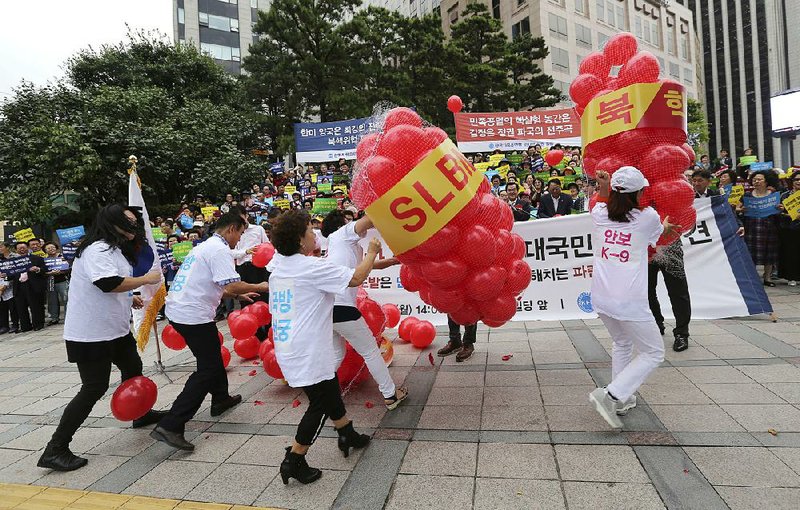The United Nations Security Council approved new sanctions aimed at punishing North Korea for its latest missile and nuclear tests after the U.S. dropped key demands in order to win support from Russia and China.
The 15-member Security Council passed the resolution unanimously Monday after a week of talks that began when Kim Jong Un's regime tested its most powerful nuclear bomb. The resolution seeks to cut imports of refined petroleum products to 2 million barrels a year, ban textile exports and give countries the ability to freeze assets of cargo ships whose operators don't agree to inspections on the high seas.
The petroleum limits would shave off roughly 10 percent of what North Korea currently gets from China, according to the U.S. Energy Information Agency.
"We are acting in response to a dangerous new development," U.S. envoy Nikki Haley told the Security Council after the vote. "These are the strongest measures ever imposed on North Korea," she said, adding that the U.S. remains willing to act alone to stop Kim's nuclear program if necessary.
While Russia and China -- which hold veto power on the Security Council -- agreed to the restrictions, the result is less than Haley had sought when she pushed for a ban on oil and a freeze on Kim's assets abroad. Moreover, it remained wholly unclear whether the additional penalties would persuade North Korea to halt its nuclear and ballistic missile tests.
Haley reacted to the bomb test last week by calling for the fullest range of international sanctions, including a cutoff of all oil supplies, in a new Security Council resolution.
Those demands were toned down in negotiations that followed with her Russian and Chinese counterparts. Late Sunday, after a series of closed meetings, a revised draft emerged, setting a cap on oil exports to North Korea but not blocking them altogether.
The resolution asks countries around the world to inspect ships going in and out of North Korea's ports, a provision put in place by the Security Council in 2009. But the resolution does not authorize the use of force for ships that do not comply, as the U.S. had originally proposed. The resolution also requires those inspections to be done with the consent of the countries where the ships are registered, which opens the door to violations.
Under the latest resolution, those ships could face penalties, but the original language proposed by the United States went much further, empowering countries to interdict ships suspected of carrying weapons material or fuel into North Korea and to use "all necessary measures" -- diplomatic code for the deployment of military force -- to enforce compliance.
Nor does the resolution impose a travel ban or asset freeze on Kim, as the original U.S. draft had set out. The new measure also adds a caveat to the original language that would have banned the import of North Korean laborers altogether, saying that countries should not provide work authorization papers unless necessary for humanitarian assistance or denuclearization.
North Korea's state media attacked both Haley and the resolution ahead of the vote, vowing the U.S. would face "the greatest pain and suffering it had ever gone through in its entire history."
"The DPRK shall make absolutely sure that the U.S. pays a due price," the Korean Central News Agency said, citing a statement by the Ministry of Foreign Affairs and using initials for North Korea's formal name, the Democratic People's Republic of Korea.
The Security Council vote comes just over a month after U.N. diplomats targeted about $1 billion in North Korean exports.
An assessment by U.S. officials has found that Russian smugglers have been shipping petroleum and other vital supplies to North Korea to help that country weather earlier rounds of economic sanctions, casting further doubt on whether financial measures alone can force Kim to abandon his nuclear weapons program.
The spike in Russian exports is occurring as China -- by far North Korea's biggest trading partner -- is beginning to dramatically ratchet up the economic pressure.
Official documents and interviews point to a rise in tanker traffic this spring between North Korean ports and Vladivostok, the far-eastern Russian city near the small land border shared by the two countries. With international trade with North Korea increasingly constrained by U.N. sanctions, Russian entrepreneurs are seizing opportunities to make a quick profit, setting up a maze of front companies to conceal transactions and launder payments, according to U.S. law enforcement officials who monitor sanction-busting activity.
"As the Chinese cut off oil and gas, we're seeing them turn to Russia," said a senior official with detailed knowledge of smuggling operations. The official, one of several current and former U.S. officials interviewed about the trend, insisted on anonymity in describing analyses based on intelligence and confidential informants.
"Whenever they are cut off from their primary supplier, they just try to get it from somewhere else," the official said.
Information for this article was contributed by Kambiz Foroohar and Nick Wadhams of Bloomberg News; by Somini Sengupta of The New York Times; and by Joby Warrick and David Filipov of The Washington Post.
A Section on 09/12/2017


